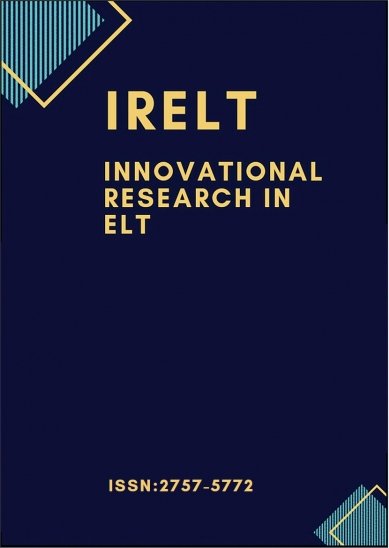Original article | Innovational Research in ELT 2020, Vol. 1(1) 45-53
Master students’ voices about post-method pedagogy
Burçin Baytur
pp. 45 - 53 | DOI: https://doi.org/10.29329/irelt.2020.311.5 | Manu. Number: MANU-2012-17-0003
Published online: December 17, 2020 | Number of Views: 382 | Number of Download: 877
Abstract
Post method pedagogy can be regarded as a good way to deal with the lacks experienced by the usage of traditional methods. It compels us to restructure our view of language teaching both in pedagogical and ideological aspects. It requires that teachers should consider the essential components of post method pedagogy. As Kumaravadivelu (2006) forwarded, post-method pedagogy can be visualized as three-dimensional system consisting of three pedagogic parameters: particularity, practicality and possibility. This study aims to explore if English as a Foreign Language (EFL) teachers, who are also Master of Arts (MA) students, have knowledge on Post-Method Pedagogy; to learn about their attitudes, beliefs and preferences towards it and to examine whether there was a probable relationship between these practising teachers’ attitudes and reflections on their classroom applications or not. To do this, 9 active EFL teachers pursuing their MA degrees at a Turkish state university, Institute of Educational Sciences, in English Language Education Master’s Programme were administered a survey. Findings indicate that the participants have knowledge of the post-method pedagogy and most of them have positive attitudes about the classroom practices regarding implementation of strategies and parameters. Participants’ responses indicated “particularity” as the most important parameter. In terms of the 10 macro-strategies, the participants gave the highest importance to the strategy of “raise cultural awareness”, while they reported to employ “activate intuitive heuristics” as the least.
Keywords: Macro strategies, particularity, pedagogic parameters, post-method pedagogy
| How to Cite this Article? |
|---|
|
APA 6th edition Harvard Chicago 16th edition |
| References |
|---|
|
Akbari, R. (2008). Postmethod discourse and practice.TESOL Quarterly, 42(4), 641- 652. Anthony, E. M. (1963). Approach, method, technique. English Language Teaching,17,63–67.https://doi.org/10.1093/elt/XVII.2.63 Arikan, A. (2006). Postmethod condition and its implications for English language teachereducation.Journal of Language and Linguistics Studies, 2(1), 1-11. Brown, H.D. (2002). English language teaching in the "post-method" era: Toward better diagnosis,treatment and assessment. In J. C. Richardsand W. A. Renandya (Eds.),Methodology inlanguage teaching (pp. 9-18). Cambridge: Cambridge University Press. Brown, H. Douglas. 2004. Teaching by Principles: An Interactive Approach to Language Pedagogy. London: Longman. Can, N. (2009). Post-method pedagogy: teacher growth behind walls. Proceedings from the 10th METU ELT Convention. Delport, S. (2010). Exploring Postmethod Pedagogy with Mozambican Secondary School Teachers. Faculty of Humanities, University of the Witwatersrand. Kumaravadivelu, B. (1994). The postmethod condition: (E)merging strategies for second/foreign language teaching. TESOL Quarterly, 28(1), 27-48. Kumaravadivelu, B. (2001). Toward a postmethod pedagogy.TESOL Quarterly, 35(4), 537-560. Kumaravadivelu, B. (2003). A postmethod perspective on English language teaching, World Englishes, 22(4), 539-550. Kumaravadivelu, B. (2003a). Beyond methods: Macro strategies for language teaching. New Haven, CT: Yale University Press. Kumaravadivelu, B. (2006). Understanding language teaching: From method to postmethod. Mahwah, NJ: Lawrence Erlbaum Associates. Prabhu, N. S. (1990). There is no best method- why? TESOL Quarterly, 24(2), 161-176. Richards, J. C., & Rodgers, T.S. (1986). Approaches and methods in language teaching. Cambridge, England:Cambridge University Press. Richards, J.C., & Rodgers, T.S. (2001). Approaches and methods in language teaching. Cambridge: Cambridge University Press. Stern, H.H. (1983) Fundamental Concepts of Language Teaching. Oxford: Oxford University Press. Tığlı,T. (2014). Method vs. postmethod!: A survey on prospective EFL teachers’ perspectives. Unpublished Master’s thesis, Bilkent University, Turkey. Tosun, B. C. (2009). A new challenge in the methodology of the postmethod era. Journal of Language and Linguistic Studies, 5(2). Wallace, M. J. (1991).Training foreign language teachers: A reflective approach. New York: Cambridge University Press. |

